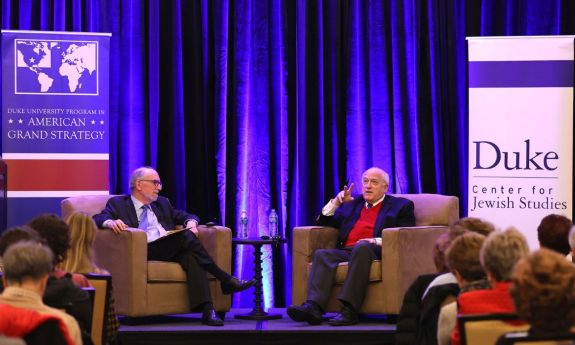Charting a Path Forward in the Middle East
Former U.S Ambassador Daniel Kurtzer discusses the future for Israel and Gaza

Bruce Jentleson, William Preston Few Distinguished Professor of Public Policy and an expert on the Middle East, led the discussion before a packed audience at the Washington Duke Inn.
A ‘Perfect Storm’ of Failures
Kurtzer said the Oct. 7 attack was “the result of a perfect storm of failures” on the part of the state of Israel, its intelligence service and its military. The first failure was Israeli Prime Minister Benjamin Netanyahu’s decision to work with Hamas instead of the Palestine Liberation Organization and Palestinian Authority.
“That failure alone was cosmic,” he said.
Middle East Events Next Week
Monday, Feb. 19: “Gaza, Israel, Palestine and the Toll of War: Humanizing the Humanitarian Crisis,” moderated by Rev. Dr. Benjamin F. Chavis Jr., Duke’s 2024 Environmental Justice and Racial Equity Fellow. Panel includes Bruce Jentleson, Associate Professor Abdullah Antepli and Sawsan Abdulrahim, a visiting scholar in the Palestine Program at the Harvard T.H. Chan School of Public Health. 5:30 p.m. 04 Sanford School of Public Policy.
Tuesday, Feb. 20: “Two Truths in One Heart; Two Peoples in One Land,” a public conversation between an Israeli and a Palestinian who both live in the West Bank about their experiences as part of Roots - Shorashim - Judur, an initiative for understanding, nonviolence and transformation, sponsored by Duke Chapel and Religious Life at Duke. 1 p.m. 0012 Westbrook Building.
He pointed to two other significant failures: An intelligence failure “of immense proportions” and a military failure.
Of the intelligence failure, Kurtzer said: “Israel knew all of what Hamas was acquiring and its capabilities but fell prey to this idea that they weren't intending to attack, and therefore in a sense went to sleep.”
How America Failed in the Peace Process
Kurtzer said that since retiring from the government, he’s taken a hard look at America’s failures in trying to bring peace to the Middle East and what might have been done better.
Jentleson asked Kurtzer whether it’s a fair critique to say that the U.S. in the past has sided too much with Israel, acting more like its lawyer than an honest broker.
“It’s 100% fair,” said Kurtzer. “There were moments when we could have performed our role better but I don't know – politics, lack of drive, lack of backbone – a lot of factors truthfully.”
Both Sides Have a Point
A career diplomat, Kurtzer noted that it’s difficult for anyone to see things from both sides.
“The Egyptians and Palestinians accused me of being an Israeli shill and the Israelis accused me of being a self-hating Jew and I said, you know, that's OK, I know what I am. It’s hard ground to maintain but it’s that ground on which you can build the possibility of working out solutions,” Kurtzer said.
What’s Next?
Kurtzer said there are many questions that still need to be answered before there are any efforts to stabilize the situation in Gaza: Who is going to collect garbage? Who is going to do the basic things that governments do? Who is going to pay for this? When and how can you start the actual rebuilding of housing, the reconnection of electricity grids?
The job, he said, will likely fall to other countries. To do that, he said, requires a multinational approach that gives those involved in the cleanup the confidence that the peacemaking process will be taking place at the same time so that they are assured the risks will be mitigated over time.
Student reaction
During a question-and-answer session that followed the hour-long discussion, students asked what a returning Trump administration would mean to the current Middle East peace process – “a disaster,” Kurtzer said – and why the Biden administration isn’t pressuring for more humanitarian aid and fewer civilian deaths.
Kurtzer said a Biden crackdown on Israel’s bombing of targets that contain civilians as well as Hamas fighters would leave the president having “to watch his domestic political back as well.”
Not everyone in the audience agreed with Kurtzer’s assessments. Law student Paige Brasington, said that while she appreciated his perspective, she also disagreed with many of the things he said.
“I think in an ideal world his ideas would work, but I don’t think that’s what we are living in and it’s certainly not a reality after the Oct. 7 attacks. At the same time, I appreciate his perspective and the history of having that inside knowledge, it was valuable to hear him speak.”
Listening to these different ideas is the goal of the provost’s initiative, with programs that model thoughtful and civil engagement, provide a forum for different perspectives on the conflicts and enhance understanding based on expertise and evidence-based scholarship.
“One of the best parts of being at Duke is that you get a wide variety and diversity of perspectives,” said Hamza Chaudhry, a second-year law student. “This feeds not only into the law school’s goal as well as Duke’s broader goal in the community.”
The event was hosted by Duke’s Program in American Grand Strategy and the Center for Jewish Studies, and sponsored by Asian & Middle Eastern Studies, Middle East Studies Center, Jewish Life at Duke, the Department of Political Science and the Sanford School of Public Policy.
Read More About the Middle East Initiative
